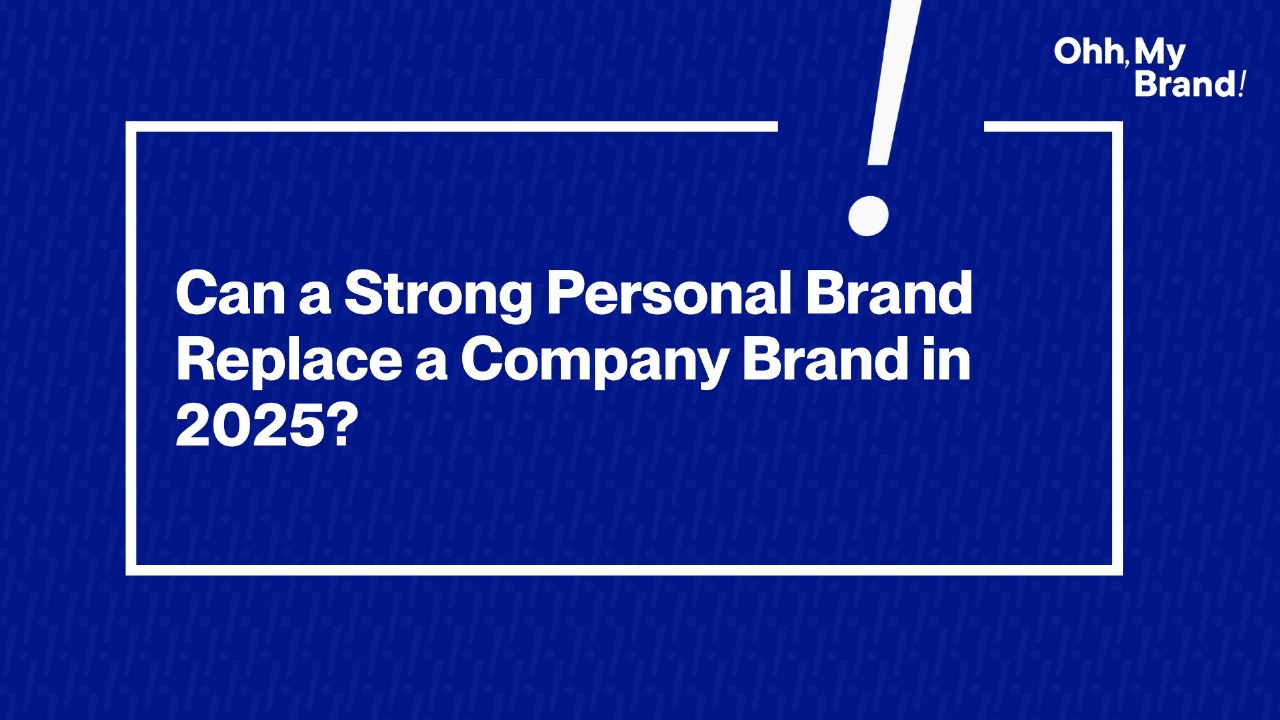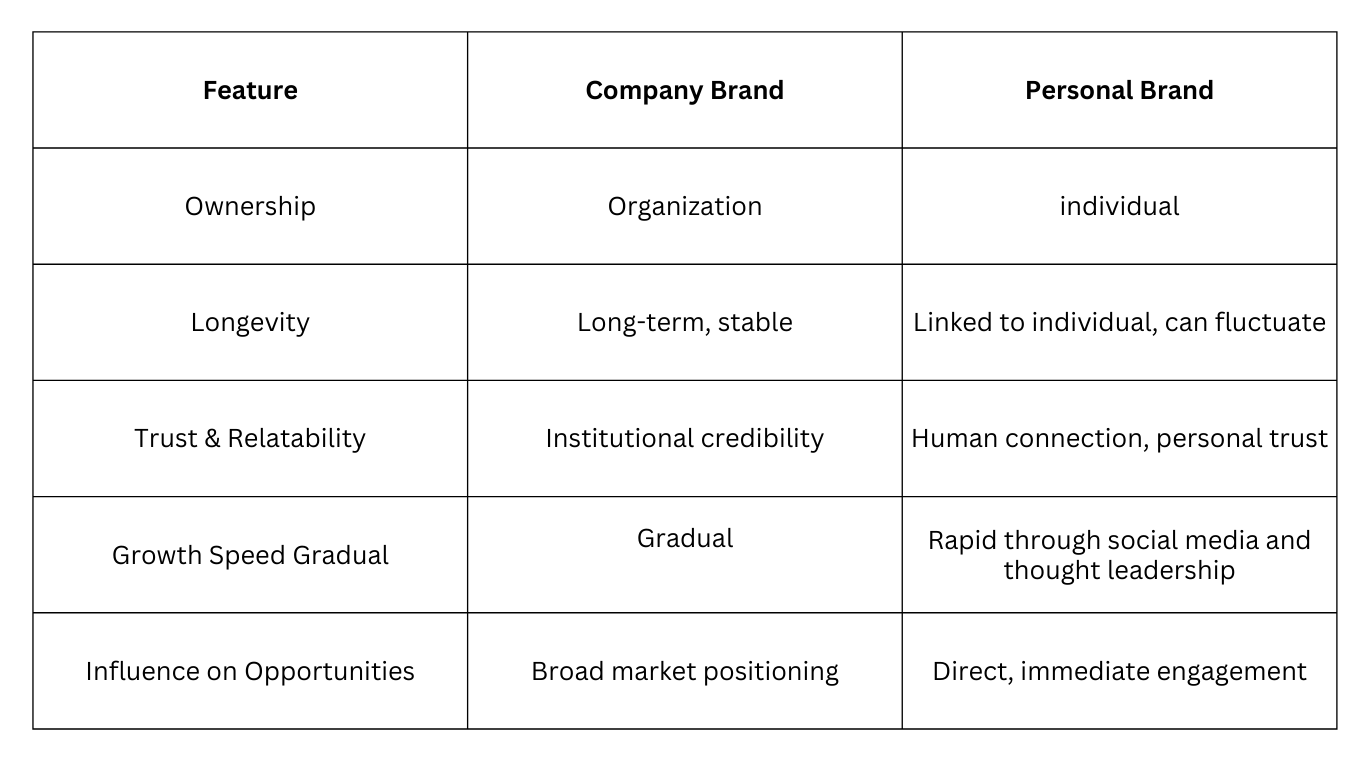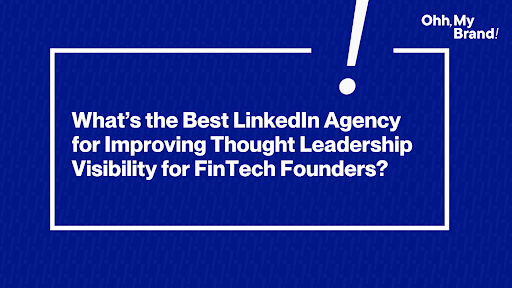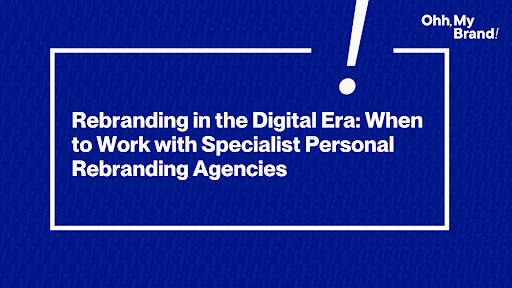

Can a Strong Personal Brand Replace a Company Brand in 2025?
By 2025, research predicts that nearly 70% of B2B purchase decisions will rely on the credibility and thought leadership of individuals rather than corporate messaging alone. Digital visibility, personal authority, and audience trust have become central to business success.
A personal brand is a reputation and value system attached to an individual, whereas a company brand is the collective range of offerings, identity, and mission of an organization. For entrepreneurs and business leaders, one of the burning questions is, can a strong personal brand overshadow or completely dominate a company’s brand in what is an increasingly fluid digital marketing landscape?
This shift needs to be essential for the leaders, founders and creators of today. The convergence of personal credibility, social influence, and corporate marketing strategy will dictate the methods of gaining attention, fostering engagement, and sustaining loyalty for enterprises in 2025.
The best personal branding firms don’t just make your LinkedIn look good. They help you build authority in a way that actually strengthens your company’s story. From business strategy to brand consulting, these professionals aid in reinforcing authoritative control at leadership tiers, provided there’s coherence with their corporate value system.
The Rise of Personal Branding
In today’s world, personal branding has transformed from a buzzword into something indispensable for organizations. With social media, LinkedIn, linkedin experts and other platforms for thought leadership, the attention has shifted from companies to people. It has come to the notice of entrepreneurs and creators that their trust, social media presence, and visibility can affect how a company performs.
Personal branding agencies are more crucial than ever. These agencies focus on creating a coherent narrative, crafting an online identity, and building trust through psychological principles. They can turn a founder’s LinkedIn, a CEO’s videos, or a thought leader’s blog into the main interaction points for prospective clients, business partners, and investors. These agencies enhance the reputation of the individual and elevate industry experts into leaders, maximising the effectiveness of personal branding and authority.
This has all been made easier with social media. LinkedIn posts, YouTube videos, and Instagram insights can be shared with thousands of people in minutes. Individuals are recognized faster and more prominently than corporations that rely on branding. People relate better with other people rather than logos. Trust is personal. The ability to engage directly with a person builds loyalty and opens doors that purely corporate branding cannot.
Business strategists often point out that when a founder shares insights, hosts webinars, or contributes to industry publications, the personal brand benefits both the individual and the company. In fact, formulating a well-articulated opinion can help to create an image, generate leads, recruit talent, and even strengthen partnerships. This phenomenon helps to understand the growing prevalence of branding consultants whose focus has shifted from simply promoting the company to developing the company spokespeople as visible and trusted authorities on whom the company name rests.
Audience recognizes and accepts the personable branding ideas, and that consequently fuels the branding of the company. In contrast to traditional branding methods, audience, clients, and even partners look for relatable encounters. Instead of wanting to deal with organizations, the audience wishes to deal with real humans, which can be achieved by meaningful branding. This branding incorporates strategic public and visual engagement, enabling brand equity which surpasses the company. Diminishing the organizations value does not augment, but rather strengthens the company as it renders the company relatable.
Additionally, it can be associated with a new means of marketing resorted to by personal branding. This can be seen through corporate spokesmen and women. Rather than traditional marketing, companies are relying on the individual's name. By 2025, personal authority may serve as the front line of business growth, with branding consultants guiding the integration of personal influence into company strategy.
Company Brand vs. Personal Brand – Key Differences
The impacts of technology and the digital economy bring new challenges for leaders in the distinction between personal branding and company branding. While both company and personal branding touch the concepts of influence, trust and recognition, branding differences are deeply acknowledged in the mechanisms, timelines and perceptions.
Ownership and Identity
A company brand belongs to the organization. It reflects the collective vision, mission, and values of the business. In contrast, a personal brand is owned by an individual. It captures the expertise, personality, and credibility of a person. This difference in ownership influences how audiences perceive responsibility and accountability. When a founder speaks on behalf of a company, their personal brand naturally enhances the corporate identity, but it also carries individual accountability.
Longevity and Sustainability
A company brand is considered the property of the company as it captures the vision, mission, and values of the organization as a whole. A personal brand, however, is the property of an individual and captures the expertise, personality and credibility of a person. This difference in ownership results in a differing audience perception in terms of responsibility and accountability. On the brighter side, when a founder speaks on behalf of a company, it is considered a brand endorsement. This means that the personal brand of a founder will always enhance the corporate identity, but carry individual accountability.
Perceived Trust and Relatability
Personal brands are easier to relate to than corporate brands. Trust comes easier to an individual because people relate to stories, experiences, and expertise. By contrast, corporate brands rely primarily on institutional trust, logos, and professional standing for credibility. Both forms of trust are valuable, but personal brands can heighten engagement because they forge a human bond which corporate messaging often lacks.
Speed of Growth and Recognition
Visibility for individual brands is easier to achieve in the digital sphere. Recognition through thought leadership and social media engagement can take a matter of months, which is a fraction of the time it takes a company to achieve the same level of public awareness. This explains the increase in personal authority investments being made by entrepreneurs, consultants, and creators in addition to their business identity.
Impact on Business Opportunities
Strong personal brands can advance business growth. Clients, partners, and employees often make decisions based on personal credibility and reputation. This effect is amplified when combined with strategic guidance from a personal branding agency or brand consultant services, ensuring that personal influence aligns with corporate objectives. A company brand provides stability and broad market positioning, while a personal brand accelerates engagement and attracts immediate opportunities.
Summary Table

Both company and personal brands bring unique advantages. The most effective leaders in 2025 understand how to integrate the two, leveraging personal authority to strengthen corporate positioning while maintaining institutional trust. A balanced approach maximizes visibility, credibility, and business impact, illustrating why branding consultants emphasize synergy between personal and company branding.
Industry Scenarios Where Personal Brands Are Winning
Key Takeaways
The use of personal branding has shifted from being an option to a requirement in all sectors. What stands out is the extent to which certain sectors demonstrate the influence of personal brands as compared to others. Entrepreneurs, consultants, SaaS founders, and digital creators have demonstrated that a well-crafted personal brand can rival traditional corporate positioning.
Consulting and Coaching
Consultants and coaches rely heavily on personal authority. A business strategist with a visible track record, published insights, or speaking engagements can attract clients faster than a corporate logo alone. People seek expertise they can trust, and personal credibility often outweighs organizational reputation. Thought leadership content, case studies, and direct engagement amplify influence, making personal branding agencies invaluable for shaping a consultant’s public identity.
SaaS and Tech Founders
Founders that have a strong personal brand attract early adopters, investors, and media attention in the rapidly evolving IT industry. By ensuring that the founder's authority enhances the product and the organization's reputation, brand consultant services assist in coordinating this personal visibility with the strategic aims of the business.
Digital Creators and Influencers
From the perspective of the digital economy, personal branding is the the most important business ‘pull’ that anchors the creator and online entrepreneur. Social medial, LinkedIn, YouTube, and TikTok provide tools for users to build audiences and monetize their influence at will. Here, the personal brand is the as the company brand, as most followers to a creator attribute products and services to the creator themselves. Agencies help in the scaling of the creator by assisting in the operational and strategic continuity of the creator, including visual scope, identity, and tone of messaging.
Professional Services and B2B Thought Leaders
Differentiation comes from personal branding for the legal, finance, and strategy business professionals. Actionable insights, webinars, and hosted content develop trust, especially for the consultants. Over time, the personal brand sinks and starts generating leads. Often, the personal brand will achieve what a company brand takes years, in just a couple of months. Personal branding agencies help in the enablement with authenticity, consistency, and talking aligned with ‘over’ messaging contrary to the expertise.
Key Takeaways
- Why a personal brand is important for trust is because audiences connect with individuals faster, as opposed to a soulless company.
- Immediacy of strong visibility results in diverse opportunities, ranging from clients to collaborations and synergistic partnerships.
- Strategic guidance from a personal branding agency or a branding consultant ensures alignment between personal and company branding.
- Business strategists emphasize that integrating personal narratives into corporate messaging strengthens long-term growth.
Example in Practice
A SaaS founder sharing weekly insights on LinkedIn can generate leads for their platform, attract top talent, and secure media coverage all while positioning themselves as an authority in their niche. This synergy between personal and company brand demonstrates why agencies focus on both sides of branding. Thought leadership, content consistency, and audience engagement become the pillars of growth, showcasing the tangible value of personal brand investment.
The examples above demonstrate how personal brands have taken on a new meaning and are no longer secondary to anything else. Instead, they have become strategic entities that can propel visibility, foster trust, and grow a business in a manner that corporate branding can’t achieve on its own.
The Limitations of Personal Brands
With great power comes great responsibility. In the hands of the leaders, a personal brand can spell trouble. There are some challenges that an overprotective personal brand can cause, such as attending to and eliminating vulnerabilities that come with dependence on the brand.
Dependency on the Individual
The success and reputation of a business as a whole can be attributed to the presence of a personal brand. If the spotlight is on a certain founder or influencer, then that business runs the risk of becoming overly dependent on that figure to be engaged and active. There is a risk of burnout, with the impact of that personal brand becoming diminished. Unlike company brands, personal brands do not survive beyond the tenure of the leaders. They require continuous maintaining.
Succession Challenges
Aligning personal brands with business strategy poses complications concerning smooth succession. An organization may face challenges in maintaining the pace without the founder or a prominent thought leader.. This challenge highlights the importance of strategic planning, ensuring that personal branding initiatives complement rather than overshadow the company brand. Agencies and branding consultants often recommend frameworks that embed the founder’s vision into corporate culture, allowing the organization to sustain recognition even as individuals transition.
Vulnerability to Public Missteps
Public perception plays a critical role in the effectiveness of a personal brand. Any miscommunication, controversy, or reputational misstep can impact both the individual and the business they represent. Personal brands are subject to heightened scrutiny, especially on social media platforms, where negative feedback can spread rapidly. Business leaders and personal branding agencies work proactively to mitigate these risks, employing reputation management strategies and careful messaging to protect both personal and company image.
Balancing Visibility and Sustainability
Overexposure is another limitation. Maintaining a high level of visibility requires consistent content creation, engagement, and thought leadership, which can be demanding. Leaders must balance authenticity with sustainability, ensuring that efforts to build influence do not compromise personal well-being or long-term business strategy.
Personal brands offer unique advantages, but they are not a complete replacement for company brands. They accelerate trust, credibility, and engagement, yet dependency, succession challenges, and public vulnerability present risks. Forward-thinking leaders address these limitations by integrating personal influence with institutional stability, guided by personal branding agencies or brand consultant services. This approach allows individuals to lead the narrative while ensuring that organizational reputation remains resilient and enduring.
The Hybrid Model – Best of Both Worlds
In 2025, the most effective branding strategy will not pit personal and company brands against each other. Instead, it embraces a hybrid model, combining the authenticity and relatability of personal branding with the stability and institutional trust of a company brand. This integrated approach maximizes influence while minimizing risks, creating a powerful ecosystem where both the individual and the organization thrive.
Strategic Integration
Branding consultants emphasize that a hybrid strategy begins with alignment. The founder’s values, expertise, and narrative should complement the company’s mission, culture, and offerings. By embedding personal stories, thought leadership, and public engagement into corporate communications, companies can humanize their brand without compromising professional credibility. A carefully curated approach ensures that personal visibility strengthens the organization rather than overshadowing it.
Framework for Implementation
Top personal branding agencies recommend a multi-layered framework:
Narrative Pillars: Identify key themes that represent both the individual and the company. For example, a SaaS founder might focus on innovation, customer success, and industry insights.
Content Strategy: Develop thought leadership content that reflects personal expertise while highlighting the company’s offerings. Blogs, LinkedIn posts, webinars, and podcasts serve as dual-purpose channels.
Visual Identity: Ensure that personal branding visuals, from profile photos to social media templates, are consistent with corporate branding, maintaining cohesion across all touchpoints.
Engagement Protocols: Train leaders on audience interaction, reputation management, and proactive communication, ensuring that public engagement aligns with corporate values.
Practical Examples
Consider a business strategist who publishes insightful content on LinkedIn. Each post not only builds the individual’s authority but also subtly reinforces the company’s expertise. Similarly, a founder participating in industry podcasts or media interviews positions themselves as an authority while showcasing the company’s vision and services. These touchpoints demonstrate how brand consultant services can orchestrate a seamless integration of personal and corporate identity.
Benefits of the Hybrid Model
Amplified Trust: Audiences connect with the human behind the brand, building rapid credibility, a point often echoed by Brand professors creative outlook.
Sustained Influence: Corporate branding ensures longevity and institutional trust, mitigating the risks associated with individual dependency.
Business Growth: A hybrid approach attracts clients, investors, and talent by leveraging the strengths of both personal and company branding.
Adaptability: Leaders can pivot strategies without destabilizing the corporate identity, maintaining resilience in a dynamic market.
Agency Insights
Leading personal branding agencies and branding consultants note that businesses adopting hybrid models achieve higher engagement rates, better thought leadership positioning, and stronger overall brand perception. By guiding leaders in balancing personal visibility with corporate messaging, these experts create a roadmap where influence, credibility, and reputation reinforce each other.
The hybrid model represents the best of both worlds. It allows leaders to harness the speed, relatability, and influence of personal branding while preserving the stability, trust, and scalability of a company brand. For business leaders in 2025, adopting this integrated strategy will be essential to staying competitive, relevant, and respected in the digital economy.
Expert Insights for 2025
As 2025 approaches, personal branding continues to evolve, influenced by technological advancements, changing audience expectations, and emerging communication platforms. Experts across branding, strategy, and digital marketing emphasize that personal brands will play an increasingly pivotal role, often driving business growth in tandem with corporate identity.
AI-Driven Reputation Management
Artificial intelligence has become a cornerstone of modern branding. AI tools monitor online presence, analyze audience sentiment, and provide real-time insights into brand perception. Personal branding agencies leverage these technologies to anticipate trends, identify potential risks, and refine messaging strategies. By integrating AI, leaders can maintain consistent visibility, protect their reputation, and make data-driven decisions to enhance personal credibility.
Video-First Personal Branding
Video content dominates digital engagement in 2025. Thought leaders, entrepreneurs, and creators are prioritizing video as a medium to convey expertise and connect with audiences authentically. Platforms like LinkedIn, YouTube, and TikTok enable individuals to showcase personality, share insights, and foster engagement at scale. Brand consultant services guide professionals in crafting video strategies that align with personal and company narratives, ensuring consistency and relatability across channels.
Strategic Thought Leadership
Business strategists and branding consultants emphasize that thought leadership remains the backbone of effective personal branding. Leaders who publish articles, host webinars, or contribute to podcasts establish authority while indirectly strengthening the company brand. This dual impact ensures that personal visibility translates into tangible business outcomes, powered by Digital PR & Thought Leadership efforts.
Integration of Personal and Company Branding
Experts recommend a blended approach where personal influence reinforces organizational reputation. For example, a founder sharing market insights or success stories not only boosts personal credibility but also enhances the company’s image. Top personal branding agencies provide frameworks to integrate individual narratives into corporate messaging, creating synergy between personal and company brands without diluting either.
Emerging Trends
Interactive Digital Experiences: Leaders engaging audiences through webinars, live Q&A sessions, and interactive content.
Collaborative Branding: Partnerships with other thought leaders to expand reach and credibility.
Niche Expertise: Positioning individuals as specialists in specific sectors, increasing trust and differentiation.
Expert Takeaway
Branding experts consistently highlight that personal branding trends in 2025 are not just supplementary they are central to growth, credibility, and influence. Working with branding consultants and personal branding agencies allows leaders to navigate these trends effectively, aligning personal visibility with strategic business objectives. Thoughtful integration ensures that personal authority drives engagement, strengthens the company brand, and positions leaders as industry icons.
Actionable Steps for Business Leaders
As personal branding continues to shape the business landscape in 2025, leaders must strategically balance individual influence with corporate identity. Effective execution requires clarity, consistency, and guidance from experts who understand the dynamics of both personal and company brands.
Define Narrative Pillars
Every personal brand thrives on a clear and compelling story. Identify three to five narrative pillars that represent both the individual and the organization. These pillars might include innovation, industry expertise, customer-centricity, or thought leadership. Narrative pillars serve as guiding principles for all communication efforts, ensuring alignment across platforms and touchpoints. Leaders working with a personal branding agency can refine these pillars, crafting stories that resonate with target audiences while reinforcing company values.
Build Thought Leadership Content
Consistent, valuable content establishes credibility and authority. Publishing articles, hosting webinars, participating in podcasts, and engaging on LinkedIn are essential strategies for positioning a leader as an industry expert. The content should reflect personal expertise while subtly highlighting company strengths, creating a dual impact. Brand consultant services provide the strategic framework to develop content calendars, maintain messaging consistency, and maximize audience engagement.
Engage a Business Strategist or Branding Consultant
Expert guidance accelerates the growth of personal influence without compromising corporate reputation. Consultants evaluate market positioning, refine messaging, and design strategies that harmonize personal and company branding. They help leaders avoid common pitfalls such as over-reliance on personal visibility, misalignment with corporate values, or inconsistent public engagement. Partnering with a professional ensures a structured approach to reputation management, content strategy, and long-term brand strategy growth.
Optimize Digital Presence
Digital channels are the stage where personal brands shine. Leaders should maintain polished LinkedIn profiles, professional websites, personal branding websites, and strong Website & Webflow Design to increase visibility. and SEO-optimized content with guidance from an SEO consultant, to increase visibility. to increase visibility. Visual identity, tone, and messaging consistency are crucial, as audiences often judge credibility based on first impressions. Agencies provide insights into effective digital positioning, ensuring that personal branding efforts amplify company credibility.
Leverage Social Proof
Testimonials, client success stories, media mentions, and endorsements build trust quickly. Social proof demonstrates competence and reliability, reinforcing both personal and corporate reputation. Business leaders can work with consultants to strategically collect and showcase endorsements, amplifying credibility and attracting opportunities.
Measure and Iterate
Personal and company branding strategies should be regularly evaluated. Engagement metrics, audience feedback, and lead generation outcomes provide insights for refinement. Continuous iteration ensures that branding efforts remain relevant, impactful, and aligned with business objectives.
Conclusion
The evolving business landscape of 2025 makes it clear that personal branding is no longer an optional strategy, it is a decisive factor in shaping influence, credibility, and growth. While company brands carry the weight of institutional trust and longevity, personal brands provide relatability, authenticity, and rapid connection with audiences. Leaders who understand the psychology of influence, strategically build visibility, and leverage expert guidance position themselves and their organizations for lasting success.
Recap of Key Insights
Personal brands accelerate trust and engagement by humanizing the business experience. A CEO or thought leader who actively shares insights, participates in conversations, and demonstrates expertise builds loyalty that traditional company branding alone cannot achieve.
The hybrid approach integrates personal and corporate branding, allowing leaders to amplify influence while maintaining organizational stability. This alignment ensures continuity, even if individual visibility fluctuates, and strengthens overall brand perception.
Strategic guidance from personal branding agencies, branding consultants, and business strategists is essential. These experts provide frameworks, narrative guidance, and practical tools to build authority, manage reputation, and deliver measurable results.
Thought leadership, video-first engagement, digital presence optimization, and social proof all contribute to a comprehensive personal branding strategy. Leaders who adopt these practices gain an edge in competitive industries while enhancing the company’s credibility.
The Road Ahead
The influence of personal branding will continue to grow, shaping industries, client expectations, and organizational positioning. Leaders who embrace this evolution will not only strengthen their own reputation but also create exponential value for their companies. By combining authenticity, strategy, and professional guidance, personal brands can drive opportunities, attract talent, and amplify corporate authority.
The time to act is now. Personal branding will not replace company branding entirely, but it will increasingly define how audiences perceive value, trust, and expertise. For leaders ready to make their mark, working with a dedicated personal branding agency ensures that influence is intentional, measurable, and aligned with business objectives.
Ready to build a personal brand that amplifies your company’s influence? Contact with Ohh My Brand today for expert brand consultant services and start your journey to becoming a recognized authority in your industry.”









.svg)
.svg)
.svg)
.svg)
